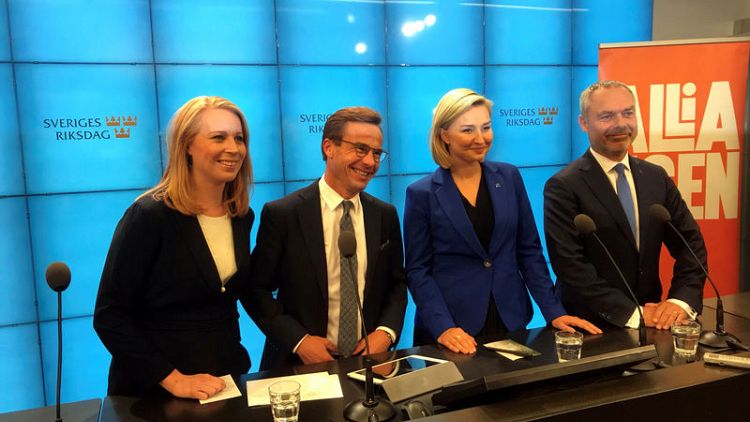STOCKHOLM (Reuters) - The leaders of Sweden's centre-right opposition Alliance on Wednesday urged the incumbent Social Democrat-led bloc to step aside and help them form a viable government to break a post-election deadlock.
The rise of the far-right Sweden Democrats, shunned by both centre-right and centre-left, left both big mainstream blocs neck-and-neck, and short of a majority, in Sunday's election.
The Alliance has already rejected an informal invitation from the current prime minister, Stefan Lofven, to support a Social Democrat-led government.
"We want to build an Alliance government with support from across the political divide," the leaders of the Moderate, Centre, Christian Democrat and Liberal parties said in a signed article in the daily Dagens Nyheter.
"Sweden needs stable economic policies and major long-term political reforms that will need broad parliamentary support to achieve."
The Social Democrats, who have dominated Swedish politics for 100 years, declined to comment, but analysts said there was no indication that Lofven would do anything other than rebuff the offer.
Preliminary election results, likely to be updated on Wednesday, show the centre-left with 40.6 percent against 40.3 percent for the Alliance, whose candidate for the premiership is Ulf Kristersson of the right-wing Moderates.
That would give the Social Democrats and Greens, together with the Left Party, which supports Lofven in parliament, 144 of the Riksdag's 349 seats, two more than the Alliance.
The Sweden Democrats, who polled 17.6 percent, have 63 seats, meaning they could give either side a majority.
But all the mainstream parties have ruled out negotiating with a party that was founded in part by activists with white supremacist and neo-Nazi links, and so far there has been no sign of compromise on any side.
Sweden Democrat leader Jimmie Akesson, who has sought to weed out overt racism and tone down some of the party's most controversial demands to broaden its appeal, has pledged to bring down any government that does not give it influence over policy, particularly immigration.
Thrashing out a deal could take weeks or months, failing which a new election - which may still not produce a majority for either side - would be necessary.
Lofven is head of the biggest party and the biggest bloc. But the Alliance argues that it has the best chance of forming a viable coalition as the centre-left bloc includes the Left Party, which would almost certainly be excluded from any future administration.
(Refiles to delete repeated phrase in paragraph 7)
(Reporting by Simon Johnson, Johan Sennero and Daniel Dickson; Editing by Kevin Liffey)
